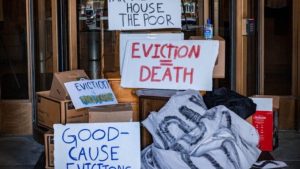 As the COVID-19 pandemic fades, many legal cases that were temporarily postponed by the Courts, such as foreclosures, are resuming and going forward in litigation. This results in more properties owned by borrowers failing to pay their mortgages being foreclosed. Due to the increased number of cases going to a final judgment of foreclosure and sale, and then being sold to the highest bidder, there is an increased amount of rental tenants in foreclosed properties. This post will discuss the legal status of these tenants and what their legal options will be during and after the foreclosure process.
As the COVID-19 pandemic fades, many legal cases that were temporarily postponed by the Courts, such as foreclosures, are resuming and going forward in litigation. This results in more properties owned by borrowers failing to pay their mortgages being foreclosed. Due to the increased number of cases going to a final judgment of foreclosure and sale, and then being sold to the highest bidder, there is an increased amount of rental tenants in foreclosed properties. This post will discuss the legal status of these tenants and what their legal options will be during and after the foreclosure process.
Many rental tenants become aware, during their tenancy, that the owner of the property is being foreclosed, due to their failure to pay the mortgage. As occupants of the premises, the tenants may be served with a foreclosure Summons and Complaint, addressed to “John Doe” and/or “Jane Doe” as occupants, due to the foreclosing lender being unaware of the names of the rental tenants.
In such a case, the rental tenants should engage experienced counsel familiar with the legal aspects of the situation. The rental tenants have several options. Until the foreclosure is completed by an auction sale and legal transfer of the property to either the lender or the successful bidder at the foreclosure sale, a legal tenant is generally not subject to eviction. If the tenant has a current lease of at least fair market value, his is permitted to stay until his lease term expires. Even after their lease expires, in general, tenants will not be subject to eviction proceedings until after the property is transferred from its current owner through the foreclosure process. The new owner may then commence eviction proceedings in the local landlord-tenant Court after it obtains title to the foreclosure property.
 New York Real Estate Lawyers Blog
New York Real Estate Lawyers Blog










